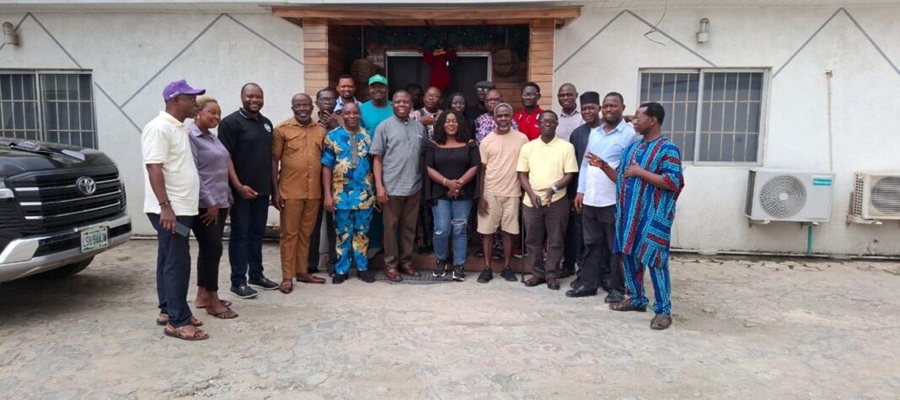Broadcasting
MultiChoice, Others Reject Senate’s Pay-Per-View DSTV Subscription Model

MultiChoice Nigeria and major stakeholders in the pay television broadcasting industry in the country have rejected a pay-per-view model advocated by the Senate.

Major cable television providers in the country currently operate the monthly subscription model.
The stakeholders said that the PPV model being canvassed by the Senate is not feasible.
MultiChoice and stakeholders in the sector made the assertions at a one-day public hearing organised by the Senate Ad-Hoc Committee investigating “Pay-Tv hikes and demand for the pay-per-view subscription model in Nigeria,” in Abuja.
The Committee was chaired by Deputy Senate Whip Senator Aliyu Sabi Abdullahi.
Some members of the panel present at the session include Senators Michael Nnachi, Suleiman Abdul Kwari and Abba Moro, who moved the motion for the Senate to investigate the incessant price hike by cable television operators in the country.
Mr. John Ugbe, Chief Executive Officer, MultiChoice Nigeria, in his presentation,said several legal and legislative moves made to compel the firm to operate pay-per-view model did not work because it was not feasible.
Ugbe said: “Whilst it may appear to be a noble intent for this Committee to be concerned over the rising cost of subscription services; however, the Pay-Per-View (PPV) model being canvassed by this Committee will not work either to the benefit of the consumer or the industry.
“It would appear that this problem is because of some confusion in understanding the basic definitions and distinctions between some of the existing operational business models in telecommunications and pay-tv broadcasting.
“A pay-per-view (PPV) is not the same and is very different from Pay-As-You-Go (PAYG).
“The PPV model allows a subscriber to watch some special one-off events, usually of the high-ticket variety in sports and entertainment, by paying for such events in addition to having an active subscription.
“Pay-As-You-Go, accommodates a metered mode of service, where consumers are billed only for the service they consume and not for a fixed period.
“The desire by this Committee to adopt PPV is further challenged by the non-existence of any technology that can detect and or determine the viewers are tuned in per time.
“Once it is impossible to have this knowledge, billings based on ‘per view’ become difficult if not almost impossible.
“It is therefore my humble submission to this distinguished committee that due to the nature of content acquisition and technological limitations that PAYG model is not practical for broadcasting and thus is not practiced and basically cannot be implemented anywhere in the world.”
On the issue of incessant price increases by MultiChoice, Ugbe attributed the development to several factors including inflation, programming content cost, broadcast transmission facilities and massive investment to innovate and keep up with technological changes.
Other factors, according to him, are anti-piracy costs, security costs, marketing and operational costs, exchange rate fluctuations, tax, regulatory fees, and cumulative national and local levies.
“Some of the adverse economic factors highlighted above have not only affected the subscription prices for pay-tv, but have generally led to substantial increments in the pricing of a wide range of goods and services ranging from essential commodities like food, transportation, clothing, healthcare, educational services to other consumer goods like petrol, building materials, cars, etc,” Ugbe said.
On his part, a former Director General of the National Broadcasting Commission (NBC), Emeka Mba, said the issues of Pay-Per-View (PPV) and Pay-TVpricing, does not amount to an important regulatory problem worthy of Senate’s intervention.
Mba: “As Harvard University’s Kennedy School of Government, Professor Malcom Sparrow famously said in his book ‘The Regulatory Craft’, Regulators should pick important problems and fix them.’
“In my humble opinion it appears that the issues being addressed today, does not reflect or amount to an important regulatory problem.
“Whilst it may appear worrying that pay Tv services subscription charges are increasing, this must be seen within the larger economic window of rising inflation, cost of living and exchange rate challenges that is faced by every sector of the economy.
“For instance, the prices of almost every item on every family’s grocery list have increased significantly, based on the realities of demand and supply occasioned by the economic factors mentioned above.”
Besides, the Chief Executive Officer of TSTV, Dr. Bright Echefu and Chief Operating Officer of Startimes, Tunde Aina, however said even if a PPV model is not feasible, Cable TV operators could adopt pay per day models to lessen the pains of poor subscribers.
Echefu said, “Pay-Per-View is not feasible but we came up with pay per day. We also allow our subscribers to choose the package based on the numbers of channels they wanted to watch.”
The Chairman’ of the Committee, Sabi Abdullahi, in his opening remarks, said the Senate constituted the panel following a motion on the subject matter approved at plenary.
He said the motion stated that various packages of the MultiChoice bouquet had been increased by 80 per cent in the last five years.
Abdullahi said the development was not in the best interest of the subscribers especially when a Court had cautioned the MultiChoice Nigeria against carrying out its latest increment which it introduced on March 30 this year.
He assured the stakeholders that the Senate had not taken a position on the matter and that the report would be based on the memorandum they submitted to the panel.
The Leader of the Senate, Ibrahim Gobir, who represented the Senate President, urged the stakeholders to be frank in their presentations so as to enable the Senate come up with recommendations that would be in the interest of all.
Abba Moro, who moved the motion, said he believed that the pay-tv should be considerate in their bouquet pricing.
According to him, the MultiChoice, which is the operator of DSTV and GOTV, has over two million subscribers.
He recounted the firm’s many price increment since 2009 till date.
Moro said: “MultiChoice increase prices without recource to the economic reality without adopting the pay-per-view.
“DSTV, GOTV will be raping Nigerians if they consistently shunned the pay-per-view model which could ameliorate the hardship being faced by the subscribers.”
However, the Deputy Director, Research and Policy at the National Broadcasting Commission, Mr. Aneke Stan Onyebuchi, who represented the Director General said the agency had no enabling law to either regulate or control the incessant price increases by cable television operators in the country.
Onyebuchi said, “There are negative reactions whenever MultiChoice incresases its price and the NBC is concerned.
“However, the NBC Act only gives it power to receive, consider and investigate complaints regarding broadcast contents. Nowhere in the Act was the NBC given powers to regulate the prices being charged on their services.”
He, therefore urged the National Assembly to amend the NBC Act to give it powers to regulate prices in the industry.
The Director, Tax Policy and Advisory, Federal Inland Revenue Service, Temitayo Orebajo, said cable TV operators are concerned about making profits despite the harsh operational environment.
He said, “The MultiChoice for instance, expresses fears that replacing monthly billing with pay-per view, will reduce their revenues.
“However, the FIRS believes that the migration will not affect their income, rather they would get more subscribers.”
The representative of the Minister of Communications and Digital Economy, Abubakar Ladan, stressed the need to amend the NBC Act to enable the agency sanction erring Cable TV operators.
He said, “We need to review the NBC Act in response to the dynamic and reality on ground, in the interest of the poor subscribers.”
Ladan, who is the Director/ Secretary, Frequency Management Council, said the ministry was doing everything to protect the interest of Nigerians.
Broadcasting
How to Use the Correlation of Gold with Other Trading Assets in the Forex Market

Gold remains one of the most powerful commodities in the global financial architecture. It is widely recognized that, for traders in Nigeria, specifically, currency pressures, inflation expectations, and shifts in global liquidity make up the macro environment more often than not; hence, understanding the correlation of gold with key Forex assets is more of an economic insight than a trading tactic.

The correlation between gold and currencies, equities, bonds, and even energy markets provides a broader framework for interpreting global risk sentiment. A growing number of Nigerian investors use this correlation to hedge against inflation, read capital-flow trends, and adjust trading strategies across major currency pairs.
Why Gold Matters in Today’s Macro Environment
This can be explained by looking at the larger picture and how global factors either positively or negatively impact the price of gold: spiraling inflation, geopolitical tension, tightening by central banks, and the flight-to-safety dynamic that heightens in moments of market stress. African traders, especially those active with international brokers such as JustMarkets, are very sensitive to how gold performs not only as a commodity but also as a macro indicator.
Indeed, the strongest correlations of gold are more often found with the US dollar, major bond markets, equity indices, and energy instruments in periods of high geopolitical risk. Each one of these offers a different angle for Nigerian traders to approach macroeconomic changes.
Gold and US Dollar: The Most Watched Correlation
The inverse correlation between XAU and the USD remains one of the bedrock relationships in global finance. It usually weighs on gold because a stronger dollar raises the opportunity cost of holding the metal. Conversely, the opposite has occurred when the market has priced in rate cuts, rising inflation, or policy uncertainty.
This relationship provides Forex traders in Nigeria with a macro perspective:
USD strength; pressure on gold; bullish signals for USD-pairs like USD/JPY or USD/CHF
USD weakness; appreciation of gold; potential strengthening of the non-USD majors
This dynamic is often emphasized by platforms such as JustMarkets in their markets analytics, allowing traders to match the technical setup with real policy shifts from the Federal Reserve.
Gold and Bond Yields: A Window into Global Risk Appetite
Gold is highly sensitive to real interest rates. When US real yields fell, it sent gold higher because investors saw it as a hedge against inflation and thus a haven. Yet higher yields tend to dampen demand for precious metals.
To traders, this correlation is a reason for short-run volatility around announcements like:
US CPI
FOMC decisions
Results of Treasury auctions
In countries like Nigeria, when domestic inflation is high and Naira pressure amplifies sensitivity to global risk, the movement of gold often proves an early indicator of how capital might rotate between safe havens and risk assets worldwide.
Gold and Equity Markets: The Fear Gauge
While geopolitical tensions or recession fears tend to deflate equity markets, they strengthen gold. This negative relationship is considered helpful for traders looking to deduce spikes in volatility and risk-off flows. Examples include:
Sharp US30 or NAS100 declines coupled with XAU/USD rallies
Broad-based sell-offs driven by political uncertainty or commodity shocks
This dynamic helps explain to the Nigerian analysts focused on policy and political economy how global risk events transmit to the local market through capital-flow sentiment.
Gold and Energy: Transmission via the Inflation Channels
Although gold and oil are not directly correlated, both respond to inflation expectations. Surging oil prices can fuel inflation forecasts that support the price of gold.
This channel is particularly important in the case of Nigeria, a major oil exporter. When crude markets temporarily tighten due to supply disruptions or OPEC policy decisions, gold becomes a complement to hedge against global inflation risk.
Trading with the Use of Gold Correlations
A structured approach allows traders to put gold’s relationships into practice:
Start with the macro driver.
Identify whether inflation, geopolitics, or monetary policy is the primary force shaping markets.Translate the macro event into correlation expectations.
Example: falling bond yields lead to a weaker USD, which in turn supports gold and could lead to upside in EUR/USD.Use correlation clusters instead of isolated signals.
Gold + USD + bonds provide a more reliable picture than gold alone.Apply risk management aligned with volatility cycles.
Gold’s volatility often spills over into major currency pairs.
Market platforms like JustMarkets emphasize these cross-asset links to help traders simplify complex macro interactions into actionable insights.
Why Nigerian Traders Pay Close Attention
The Nigerian economy is highly integrated into global commodity flows; inflation cycles, dollar liquidity, and geopolitical developments tend to reach the local market faster than the pace at which policy adjustments can be made.
Gold serves as a barometer of global risk, a hedge against currency depreciation, and a signal of moves in the key USD pairs that headline Nigeria’s trading activity.
In a region increasingly active in the Forex market, understanding the relationships involving gold is not just about trading but also a strategic tool for analyzing global economic behavior
Broadcasting
Tim Akano Recounts 20-Year Growth, Media Support at NITRA End-of-Year Meet

Mr. Tim Akano, New Horizons Chief Executive Officer, took centre stage at the Nigerian Information Technology Reporters’ Association (NITRA) annual end-of-year meeting on Thursday, December 18, 2025, recounting the company’s remarkable growth and reaffirming free IT training for journalists.

Tim Akano, New Horizons Chief Executive Officer, in a group photograph with NITRA Members
Speaking directly to IT media members at the company’s training facility in Lagos, Akano acknowledged the critical role journalists played in supporting New Horizons during its formative years two decades ago.
He detailed how the firm evolved from a handful of staff to one of Africa’s leading ICT skills training organisations, now employing about 500 staff across multiple training centres nationwide.
Akano Spotlights Youth Training, University Partnerships
Akano highlighted that New Horizons has trained over 500,000 youths, particularly tertiary institution students, equipping them with practical IT skills essential for Nigeria’s digital economy.
He announced recent partnerships with universities, including a new agreement with Afe Babalola University, to scale hands-on training programmes for students.
“This growth would not have been possible without the media’s support in documenting our journey,” Akano stated, pledging continued free IT skills training for media members to remain competitive in the evolving digital landscape.
Reciprocal Support Defines Long-Standing Partnership
The venue hosting the NITRA meeting underscored Akano’s generosity; NITRA Secretary Chidiebere Nwankwo secured the free facility after contacting him—a gesture consistent with New Horizons hosting multiple association events and training IT journalists since its inception 20 years ago.
Participants shared personal testimonies of Akano’s support, including veteran journalist Aaron Ukodie, whose daughter—an Accounting graduate from the University of Johannesburg—received NYSC placement and IT scholarship at New Horizons.
The Guardian’s Yemi Adeyemi recounted Akano accommodating his editor’s child for mandatory IT training after other firms declined.
Members praised Akano’s commitment to human capital development as evidence of deep appreciation for the media community that chronicled New Horizons’ success over two decades.
Broadcasting
NIMC rolls out Pre-Enrolment Portal for seamless NIN registration

National Identity Management Commission (NIMC) has launched the NIMC Pre-Enrolment Portal to revolutionise the National Identification Number (NIN) enrolment process, enabling applicants within Nigeria and in the Diaspora to capture biodata online prior to biometric verification at enrolment centres.

NIMC
Accessible via penrol.nimc.gov.ng, the platform allows users to fill enrolment forms, schedule appointments, upload supporting documents securely, and manage personal details directly, thereby slashing congestion, minimising wait times, boosting data accuracy and enhancing overall service efficiency at centres nationwide.
NIMC Director-General and CEO, Engr. (Dr) Abisoye Coker-Odusote, spearheaded the initiative as part of the Commission’s technology-driven strategy to fortify institutional performance, aligning with President Bola Ahmed Tinubu’s Renewed Hope Agenda that emphasises digital transformation, efficient public service delivery and inclusive national development.
Dr Kayode Adegoke, Head of Corporate Communications, highlighted key benefits including simplified biodata handling, confidential data protection through robust security measures, reduced physical centre visits and heightened operational effectiveness, urging all prospective enrollees to adopt the portal for a faster, citizen-friendly experience.[conversation_history]
The move underscores NIMC’s mandate under the NIMC Act No. 23 of 2007 to manage the National Identity Database, issue NINs and foster a reliable digital identity ecosystem vital for national planning, with users advised to complete pre-enrolment online before heading to selected centres for biometrics.

 Telecom3 days ago
Telecom3 days agoNnaemeka Ani – The Architect of ‘Code and Courage’

 E-Financial3 days ago
E-Financial3 days agoNigeria’s N58.18trn Budget and Rising Cost of Deficit Governance

 Telecom3 days ago
Telecom3 days agoMTN Nigeria Appreciates Partners, Customers at Lagos Prestige Experience

 Telecom2 days ago
Telecom2 days agoT2 Faces NCC Probe in Benue Over Major Service Outage in 9 LGAs

 Telecom2 days ago
Telecom2 days agoMTN Nigeria Crowns Ayo Benzi Winner of Next Afrobeats Star

 E-Business2 days ago
E-Business2 days agoJumia CEO says Black Friday Signals Nigeria’s E-Commerce Maturity

 E-Financial2 days ago
E-Financial2 days agoGTCO Secures Regulatory Approvals to Raise N10bn in Private Placement

 Telecom2 days ago
Telecom2 days agoNCC Grants 45 Days for Telecoms Firms to Fix Unapproved Shareholding Changes
























